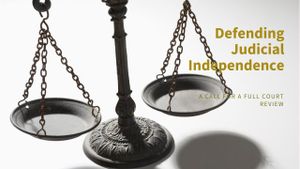On June 19, two activists from the environmental campaign group Just Stop Oil found themselves at the center of controversy after allegedly throwing orange paint over the iconic stone structure of Stonehenge. Rajan Naidu, 74, and Niamh Lynch, 22, appeared at Salisbury Crown Court to face serious accusations pertaining to their actions.
Both individuals pleaded not guilty to two charges: one of damaging the ancient protected monument and another of causing public nuisance. The incident, which involved defacing the historic site with orange powder paint, serves as both their protest and the legal battleground as they aim to defend their actions. A third defendant, Luke Watson, aged 35, was excused from the hearing and did not enter any pleas against the charges he faces.
The case has garnered significant media attention, highlighting the lengths to which climate activists will go to draw attention to their cause. Following the court proceedings, it was announced the trial for Naidu and Lynch is set for October 30. A pre-trial review hearing is scheduled for September 19, whereas Watson’s next court date is May 30. It remains to be seen how the courts will handle this intersection of environmental activism and legal accountability.
The actions taken by Just Stop Oil at Stonehenge were not isolated; they are part of larger protests directed against fossil fuel dependency, underscoring the urgent call for climate action. The activists hope their symbolic act at the ancient site will spur conversations about the dire consequences of climate change, pointing out the necessity of protecting not just natural environments but cultural heritage as well.
Stonehenge, recognized as a UNESCO World Heritage site, has served as the backdrop for various significant historical narratives. Its prominence means it is often the focus of protests and demonstrations aiming to leverage its historical value to amplify modern issues. Just Stop Oil’s actions are steeped not only in the desire for change but demonstrate the tension between preserving such historical places and advocating for urgent environmental reforms.
The environmental conversation continues to evolve, with protests at key landmarks attracting diverse viewpoints. While many applaud the activists for their boldness, others decry their methods, believing they detract from the genuine message of climate activism. Officials and students of law must now navigate the complex interplay of legal ramifications and civil disobedience, particularly when crafted against the backdrop of such culturally significant sites.
After the court hearing, both Naidu and Lynch reiterated their commitment to the climate cause. They stated, "We pleaded not guilty to two charges of damaging an ancient protected monument and causing a public nuisance," ensuring their actions were framed within the larger narrative of urgent climate action. The court's response and the subsequent legal outcomes remain highly anticipated by both supporters and critics of the movement.
While some may view the act of throwing paint as vandalism, others perceive it as necessary civil disobedience to draw attention to the climate crisis and the need for immediate action to combat it. Just Stop Oil organizers argue such extreme measures are occasionally required when traditional forms of advocacy seem to falter.
The upcoming months will see significant developments as the legal challenges progress through the system, alongside continued public discourse around climate activism. Just Stop Oil not only challenges government policies but also confronts societal complacency toward environmental degradation, aiming to provoke thought and stimulate wider engagement with the climate crisis.
Whether these actions will sway public opinion or bring about legislative changes remains unclear, but they undeniably continue to stoke the fires of debate surrounding the right methods of protest and the urgency surrounding climate action.
Engagement with the climate issue is at a peak, with the eyes of both the public and the judicial system now on these activists and their upcoming trials. The broader themes of sacred space versus civil action and the role of the legal system concerning urgent societal issues present challenges not only for activists but for lawmakers and the general public as debates around climate continue to swirl.



